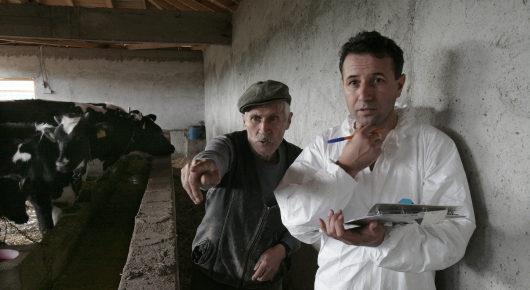FAO partners with Swedish university in fight against antimicrobial resistance

Antimicrobial resistance threatens to thrust the world into a post-antibiotic era where today’s life-saving medicines fail. Slowing the development of drug-resistant microbes is the aim of a new partnership between FAO and the Swedish University of Agricultural Sciences.
FAO is driving global efforts to keep antimicrobials working to protect animal and public health by tackling a core challenge: the overuse and misuse of antimicrobials across sectors accelerates the rate at which microbes develop resistance.
Building on the FAO Action Plan on Antimicrobial Resistance, the Swedish University of Agricultural Sciences (SLU) will take up the challenge of developing a manual of practical, stepwise approaches to more cautious use of antimicrobials by veterinarians and livestock producers.
“We are pleased to work with SLU in developing a critical resource to help veterinarians and farmers in the Balkans, Central Asia and Eastern Europe update their practices for prudent use of antimicrobials and sustainable livestock production,” said FAO animal production and health officer Andriy Rozstalnyy.
“Many of the good practices recommended, such as improved farm biosecurity, are also an investment in more sustainable production overall to feed a growing population,” Rozstalnyy noted.
Production of the manual is a key part of FAO’s worldwide initiative as antimicrobial resistance, or AMR, is a global problem that requires changes of practice in every region to stay ahead in this evolutionary arms race.
SLU's Global Cooperation Unit’s Professor Ulf Magnusson will lead the project, distilling and reconciling the disparate guidelines and recommendations of top experts into a single easy-to-use manual of practical approaches to help guide veterinary services for food-producing animals.
‘’SLU is ready to take on this important mission with FAO,’’ said Ylva Hillbur, SLU Vice-President of International Relations, in a statement.
Sweden successfully banned the routine use of antibiotics for growth
promotion in the livestock sector in the 1980s – without
compromising animal health and welfare.
In addition to the new manual, educational workshops will be organized under the partnership. The University has a history of transferring Swedish experience through international training and knowledge-sharing exercises. Sweden has helped lead the way in tackling antimicrobial resistance in agriculture, having successfully banned the routine use of antibiotics for growth promotion in the livestock sector in the 1980s – without compromising animal health and welfare.
While antimicrobial resistance has the potential to become a devastating burden on public health, food production and economies, if left unchecked, “quick action on AMR can set us onto a more peaceful, healthy and prosperous sustainable development path so that we can become the Zero Hunger generation,” Rozstalnyy said.
Tackling AMR in livestock production will be a focus of an FAO event within the Global Forum for Food and Agriculture event in Berlin on 19 January 2018 – as another occasion to raise awareness around the issue.
12 January 2018, Budapest, Hungary
